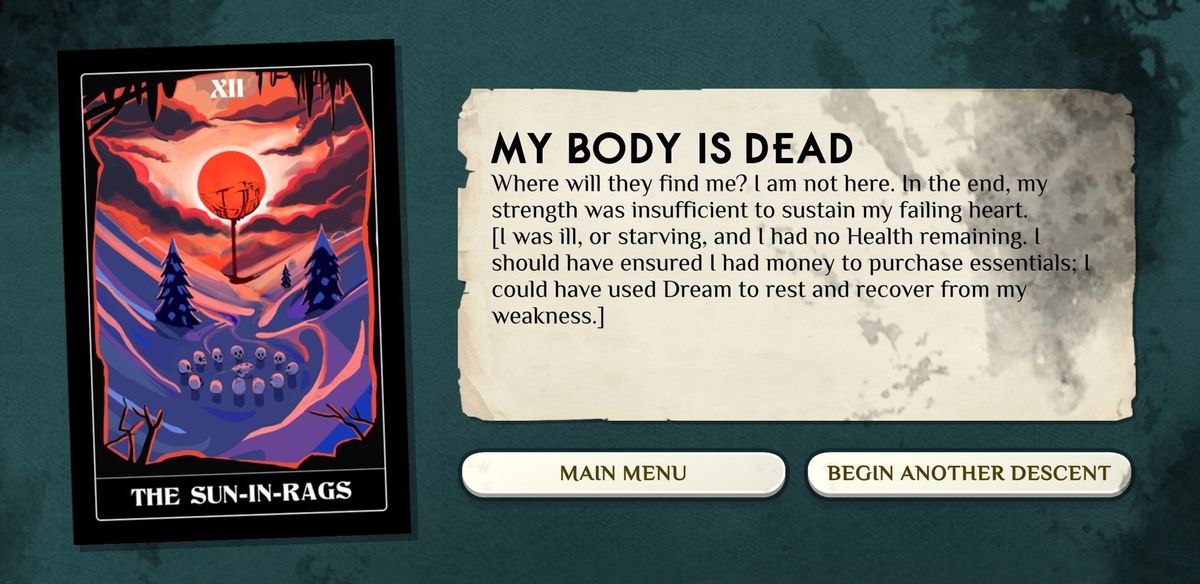I'm a big fan of nuance, innuendo, and puns, so games with names like Cultist Simulator, which tell you exactly what they are right in the title, are usually not my jam. I like a little mystery, you know? But I'm a diehard fan of anything that can be described as Lovecraftian, so I was willing to give Cultist Simulator a try — and thank Tsathoggua I did.
The overall themes of the game are very much in line with the Lovecraft tradition. Dreams, madness, and monolithic entities lurking just beyond the horizon of mortal comprehension are all heavily featured here and are integral to the mystery and atmosphere of the game. If you're a fan of just about anything Lovecraft-adjacent, you'll definitely want to give this game a try. Playing Cultist Simulator is like putting together a vast puzzle, and this chaotic conspiracy board is well worth your time.
In spite of its very on-the-nose title, Cultist Simulator actually does leave quite a lot to the imagination. Specifically, there's no tutorial, so you're thrown into the game completely blind — a purposeful decision, according to the developers.
There's no tutorial and that's a choice not an accident.
After bumbling my way through the dark for the first couple of "levels" (there aren't really levels, this is just what I'm calling the game's different phases), I finally felt like I was starting to get the hang of things and let me tell you, there is a lot to unpack with this fascinating game.
The short version is that Cultist Simulator is a card-based simulator where you take on the role of, you guessed it, a cultist. If you've ever played any of the Lovecraft-inspired board games (Eldritch Horror, Arkham Horror, etc) you'll actually have a bit of a head start going into this harrowing ordeal thanks to some familiar elements in your proverbial toolkit. Your character's overall well-being is defined by four key components: health, reason, passion, and funds, each of which is represented by their respective cards.

You can acquire funds cards by performing your character's job, reason cards by studying, passion by dreaming, and so on. There are more ways than this to stock up on your core cards, but that's the gist. All of these core elements are vital to your survivability, but funds and health are especially important, when you consider that running out of either of them will usually lead to a quick death.
Along with your core cards, you'll start amassing a deck of other curious cards by completing tasks, the first of which is working at your job. Tasks are represented on your virtual mat by square icons. Clicking on these icons will pull up the task in question and you'll then place your chosen cards into these tasks to start completing them. Once you've chosen a card to assign to a task (like slotting a Book of Poetry card into the Study task), a small timer will start counting down on the task, indicating how long the task will take to finish.
This is where things start getting intense, because balancing your tasks while also making progress becomes increasingly more complex the further you make it into any given "level". Completing tasks is crucial to your success because it gives you more cards to add to your arsenal, but it can also lead to unexpected and even unwanted results.
There's a compelling story woven together with snippets of text peppered throughout Cultist Simulator
The types of cards you can obtain are incredibly varied, as well. Outside of your core set, you can acquire people, places, abilities, items, and more. This is a whole other level of complexity, as the trial-and-error process of figuring out how certain cards can interact with each other, which tasks they can be used for, and what types of results using certain cards will give you is a satisfying experiment.
Intermingled with all of this exploration, study, and shady business is some great writing. It's hard to tell a compelling story with no dialogue or cutscenes, but Cultist Simulator does a great job of building out an immersive world using only the minimal amount of text available on card and task descriptions. Functionally, the game plays out a lot like a Choose Your Own Adventure story, where the actions you choose to take, and the ones you don't take, impact your final results.

There's only one real complaint that I have with Cultist Simulator and that's the user interface. The UI is very small (even on larger screens) and as your play area continues to expand, it becomes crowded and hard to manage. I doubt this was an issue with the original PC/Mac version, so unfortunately this issue is likely rooted in the transition to mobile. This is a game that I will most likely continue to play using an Android emulator, like BlueStacks, just to reduce the strain on my eyes from reading all that tiny text.
The UI is tiny and the screen quickly becomes crowded and hard to manage.
That being said, I am thoroughly engrossed with this enthralling game and can't wait to continue delving deeper into the madness. The developer, Weather Factory, has also released a handful of DLC packs in later updates, so you can keep playing and uncovering new facets to this wild game for hours and hours. What's more, if you get Cultist Simulator on Play Pass like I did, you get the game and all of its DLC for free.
Otherwise, Cultist Simulator will run you $6.99 and the DLC packs cost extra on top of that. I'd say the game is well worth its cost though, considering its level of complexity, great writing, good soundtrack, and overall fun factor. This is one I would definitely recommend to those looking for a challenging interactive horror story experience and may be one of the best Android games out there.

Cultist Simulator
Cultist Simulator crafts an immersive tale of cosmic doom using cards and clever gameplay. For fans of Lovecraft-influenced stories, this game is a must play.
Update: Weather Factory founder Alexis Kennedy was accused in 2019 of abuse by several women in the games industry. The writer of this article was unaware of the allegations before writing the piece.

A lifelong gamer, Mogan has had a controller in hand since the PlayStation 1 ruled the world and Neopets seemed eternal. She loves to play new and old games alike, especially if it's something weird and charming. Puzzlers, JRPGs, adventure, and rhythm games are her favorites.













